The Itchy-Scratchy Cycle Of Eczema
- Posted on: Mar 15 2016
 If you suffer from eczema (a general term for any type of “itchy rash”) it may not help to know that the word “eczema” comes from a Greek word meaning “to bubble or boil over.” That’s for sure how it feels as you scratch at your dry, damaged skin, releasing inflammatory chemicals which cause an itchy, red rash. It is a frustrating, painful cycle.
If you suffer from eczema (a general term for any type of “itchy rash”) it may not help to know that the word “eczema” comes from a Greek word meaning “to bubble or boil over.” That’s for sure how it feels as you scratch at your dry, damaged skin, releasing inflammatory chemicals which cause an itchy, red rash. It is a frustrating, painful cycle.
There are several skin conditions that can be classified as eczemas – all types cause itching and redness; some will blister, weep or peel. Atopic dermatitis is the most severe and chronic eczema. While there is no cure for it and it is not contagious, in most cases, eczema is manageable.
Symptoms vary from person to person but include dry, red, itchy patches on the skin which break out in rashes when scratched. No matter which part of the skin is affected, eczema is almost always itchy. Sometimes the itching starts before a rash appears. The rash most commonly appears on the face, back of the knees, wrists, hands, or feet. Many people have eczema and it is different for each person who has it. But remember, there is no need to be embarrassed by it.
Diagnosing eczema is your doctor’s area of expertise, but here are some of eczema’s symptoms:
- Dry, sensitive skin
- Intense itching
- Red, inflamed skin
- Recurring rash
- Oozing or crusting
The exact cause of eczema is unknown, but it’s thought to be linked to an overactive response of the body’s immune system to an irritant, such as coarse fabrics, excessive sweating, soaps, detergents, disinfectants, fruit juices, dust mites, animal saliva and dander, upper respiratory infections and stress. Eczema is commonly found in families with a history of allergies or asthma.
The goal of treatment is to reduce the itching-scratching-cycle using moisturizing creams, cold compresses and anti-inflammatory corticosteroid creams and ointments. If these prove insufficient, your doctor may prescribe corticosteroid medication, antibiotics to combat infection, or sedative antihistamines. Although there is no cure, most people can effectively manage their eczema with medical treatment and by avoiding irritants.
If you are experiencing the symptoms of eczema, call, today, for a consultation appointment: (301) 249-0970.
Posted in: Eczema


